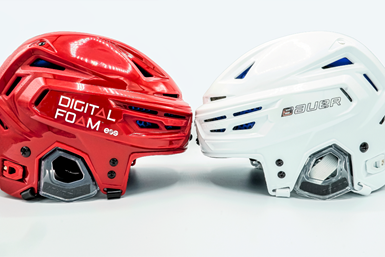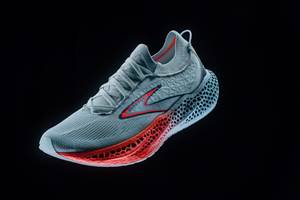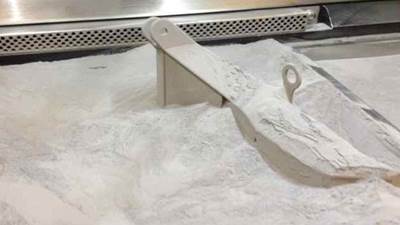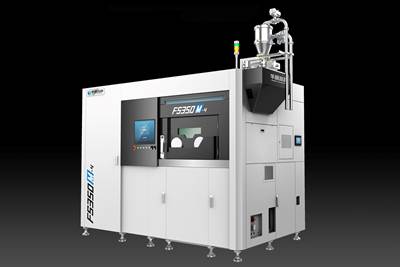EOS Launches Digital Foam Architects Network
EOS created the collaborative additive manufacturing alliance to accelerate time-to-market for 3D printed foam applications.
EOS has launched its Digital Foam Architects network, designed to accelerate the development and additive manufacturing (AM) of consumer, medical and industrial products featuring Digital Foam applications. Founding members include EOS, Arkema, General Lattice and DyeMansion.
It is said Digital Foam breathes new life into mature products, while also creating entirely new product offerings — from athletic shoes and orthotics to protective gear and medical products. The material enables manufacturers to “dial-in” exactly the performance or features they need to deliver product differentiation as well as provide mass customized product offerings.
Digital Foam applications typically have complex requirements, requiring multiple disciplines to ensure success. The Digital Foam Architects network formalizes an alliance of AM experts ready to bring ideas to production, including design software, materials and the various AM hardware elements — from printing to postprocessing and colorization.
“Digital Foam applications can be designed and produced with tailored features for performance, protection and lightweighting,” says Jon Walker, EOS government relations and key accounts manager. “But Digital Foam is not a product, rather it is an approach to 3D printing foam-like products. The Digital Foam Architects network is another chapter in the maturation of this approach by coalescing the required AM expertise. We are very pleased to announce our first commitments to this network of experts.”
Arkema says it is committed to supporting new additive manufacturing application development through more sustainable material solutions. “In collaboration with EOS, we continue to push the boundaries on what is feasible in 3D printing by combining strong enablers, such as Digital Foam, and new materials, such as Pebax elastomers,” says Adrien Lapeyre, director of Arkema 3D printing program. “We look forward to the growth of Digital Foam and we will continue to play an active role in this program.”
Underpinning Digital Foam is the EOS patent relating to any generatively 3D printed object which has a flexible grid-like structure or matrix (for example, a lattice), composed of open cells that are joined together in groups of differing characteristics. Described in basic terms, this covers any varying 3D printed lattice structures morphing into each other.
The network will expand its partners as Digital Foam continues to be leveraged as an additively manufactured flexible lattice solution.
- Read how Bauer Hockey uses EOS 3D printed digital foam for customizing helmets. The new in-store experience, combined with proprietary 3D printing technology, opens the door for personalized hockey products.
- Listen to this episode of The Cool Parts Show to hear how 3D printing will deliver tailored products. Scanning feet for their geometry and pressure enables Aetrex and EOS to manufacture insoles that are unique to individual wearers.
Related Content
Fizik Utilizes Carbon DLS Technology for One-to-One Program, Creating Customized Bike Saddles
Fizik’s customized bike seat program uses Carbon’s Digital Light Synthesis technology and personalized rider data to create a line of truly custom saddles, giving bike riders the best bike seat for their posterior — only made possible through additive manufacturing.
Read MoreSustainable Furniture Company Model No. Maintains Product Focus with Switch from DIY to Industrial 3D Printers
The startup founded in 2018 has matured in its product offerings as well as its manufacturing equipment, moving from homegrown 3D printers to industrial large-format machines.
Read MoreHP Works With Brooks Running to 3D Print Performance Footwear
HP has collaborated with Brooks Running to create the Brooks Exhilarate-BL which features 3DNA, a 3D-printed midsole technology that delivers a propulsive, bouncy ride.
Read MoreItalian Furniture Maker Uses WASP Technology to Create 3D Printed Pendant Lamps
The versatility of 3D printed ceramic enabled the designers to shape a weave reminiscent of the beehive concept, enhanced by the light source.
Read MoreRead Next
Postprocessing Steps and Costs for Metal 3D Printing
When your metal part is done 3D printing, you just pull it out of the machine and start using it, right? Not exactly.
Read MoreAlquist 3D Looks Toward a Carbon-Sequestering Future with 3D Printed Infrastructure
The Colorado startup aims to reduce the carbon footprint of new buildings, homes and city infrastructure with robotic 3D printing and a specialized geopolymer material.
Read MoreBike Manufacturer Uses Additive Manufacturing to Create Lighter, More Complex, Customized Parts
Titanium bike frame manufacturer Hanglun Technology mixes precision casting with 3D printing to create bikes that offer increased speed and reduced turbulence during long-distance rides, offering a smoother, faster and more efficient cycling experience.
Read More





















